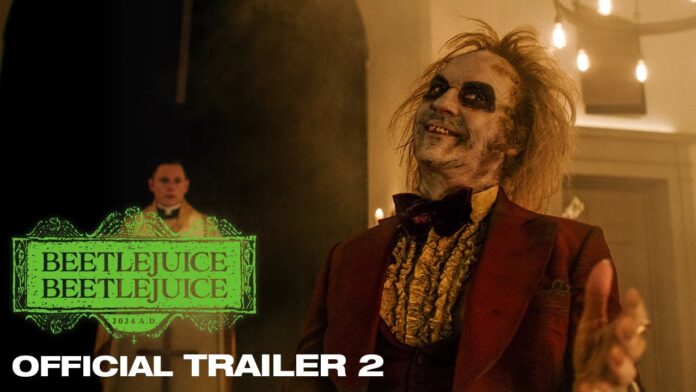Warner Bros. Pictures has released the full-length trailer and official poster for “Beetlejuice Beetlejuice,” the much-anticipated sequel to Tim Burton’s 1988 classic
Warner Bros. Pictures has unveiled the new trailer for “Beetlejuice Beetlejuice,” the long-awaited follow-up to Tim Burton’s beloved 1988 film. Michael Keaton reprises his iconic role as Beetlejuice, joined by original cast members Winona Ryder and Catherine O’Hara as Lydia and Delia Deetz. Jenna Ortega, known for her role in “Wednesday,” plays Lydia’s daughter, Astrid.
After a sudden family tragedy, three generations of the Deetz family find themselves back in Winter River. Lydia’s life takes a chaotic turn when Astrid, her rebellious teenage daughter, stumbles upon the town’s mysterious model in the attic, inadvertently opening a portal to the Afterlife. With chaos brewing in both the mortal and supernatural realms, it’s inevitable that Beetlejuice’s name will be uttered three times, summoning the mischievous demon to wreak havoc once again.
The film boasts a stellar supporting cast, including Justin Theroux, Monica Bellucci, Arthur Conti, and Willem Dafoe. Tim Burton directs from a screenplay by Alfred Gough and Miles Millar. Producers Marc Toberoff, Dede Gardner, Jeremy Kleiner, Tommy Harper, and Burton himself ensure that the sequel maintains the quirky charm and dark humour of the original.
Rated PG-13 for its “violent content, macabre and bloody images, strong language, some suggestive material, and brief drug use,” “Beetlejuice Beetlejuice” is set to hit theatres on September 6th.
Analysis
Political
The release of “Beetlejuice Beetlejuice” reflects the entertainment industry’s ongoing trend of revisiting and revitalizing beloved franchises. Politically, it underscores Hollywood’s inclination to bank on nostalgia and proven formulas to ensure box office success. This strategy often sparks debates about the industry’s creativity and the balance between original content and sequels.
Social
Socially, “Beetlejuice Beetlejuice” taps into the multi-generational appeal of its predecessor. By bringing back original characters and introducing new ones, the film bridges the gap between fans of the original movie and a younger audience. This blending of generations reflects contemporary societal themes of legacy and the impact of past generations on present ones.
Racial
The casting of a diverse ensemble in “Beetlejuice Beetlejuice” indicates an effort to make the film more inclusive. While the original cast returns, the addition of new characters from various backgrounds showcases a broader representation, aligning with ongoing discussions about diversity and inclusion in Hollywood.
Gender
The sequel places strong female characters at the forefront, continuing the story of Lydia Deetz and introducing her daughter Astrid. This focus on female-led narratives is significant in promoting gender equality in film, highlighting the importance of strong, multifaceted female characters in both lead and supporting roles.
Economic
Economically, the release of “Beetlejuice Beetlejuice” is a strategic move by Warner Bros. Pictures to capitalize on the enduring popularity of the original film. By creating a sequel, the studio aims to attract both nostalgic viewers and new audiences, potentially leading to substantial box office revenue. This approach reflects broader economic strategies in the film industry, where familiar franchises often serve as financial safety nets.
